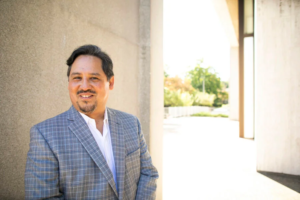The council raised concerns about the loss of public green space in a busy location
Westminster city council has objected to a proposal to build a national Holocaust memorial centre in a park next to the Houses of Parliament.
The council’s planning committee raised concerns about the impact of the plans on one of the few remaining green spaces next to the River Thames in central London.
However, the final decision has been taken out of the council’s hands after the secretary of state for housing, communities and local government “called in” the planning application in November.
The ministry will hold a public inquiry into the proposal before taking a decision on its future later this year.
Following the council’s decision, communities secretary Robert Jenrick said the government remained “implacably committed to the construction of the Holocaust Memorial and Education Centre right at the heart of our democracy, beside our national parliament to ensure that future generations never forget. No one, whether in national or local government should shirk their duty to deliver on the promise of this memorial, and the government certainly will not.”
The proposal for a memorial and education centre in Victoria Tower Gardens dedicated to the 6 million Jews and other victims murdered by the Nazis has been dogged by controversy.
The scheme was initiated by David Cameron in 2013, and a competition to design the memorial attracted some of the world’s leading architecture and design consortiums.
A team led by Sir David Adjaye was chosen to design the project, but more than 10,000 people signed an online petition calling on the government to reconsider the location.
On Tuesday, the council said it was concerned about the potential impact on “existing monuments and the adjacent world heritage site of the Houses of Parliament and Westminster Abbey”.
The proposal could also mean the “loss of valuable open, public green space in a very busy and popular location”, and loss or damage to trees.
Robert Rigby, the council’s chair of planning, said: “As a council we’re completely behind the principle of having a Memorial and Learning Centre in central London to commemorate those that lost their lives in the most heinous crimes of the 20th century.
“We must never let people forget the Holocaust and need to always educate future generations to stop it from ever happening again.”
However, he added: “If it were Westminster city council taking a decision on the application, it would have been refused on heritage grounds; the location in Victoria Tower Gardens, its size and design would cause considerable harm and would have a significant, detrimental impact on one of the few remaining green spaces on the Thames Embankment.”
Mala Tribich, a Holocaust survivor, told the meeting that a memorial next to Parliament would be a “lasting legacy so that future generations will understand why it’s important to learn from the Holocaust and stand up against prejudice”.
Ed Balls, the former shadow chancellor and co-chair of the UK Holocaust Memorial Foundation, said it was “regrettable” that Westminster council did not support the project.
He said: “In the decades to come, when survivors of the Holocaust are no longer with us to recount their experiences, the memorial will ensure that their suffering and the terrible tragedy that they experienced, will never be forgotten.”
America faces an epic choice…
… this year, and the results will define the country for a generation. These are perilous times. Over the last three years, much of what the Guardian holds dear has been threatened – democracy, civility, truth. This US administration is establishing new norms of behaviour. Anger and cruelty disfigure public discourse and lying is commonplace. Truth is being chased away. But with your help we can continue to put it center stage.
Rampant disinformation, partisan news sources and social media’s tsunami of fake news is no basis on which to inform the American public in 2020. The need for a robust, independent press has never been greater, and with your support we can continue to provide fact-based reporting that offers public scrutiny and oversight. Our journalism is free and open for all, but it’s made possible thanks to the support we receive from readers like you across America in all 50 states.
On the occasion of its 100th birthday in 1921 the editor of the Guardian said, “Perhaps the chief virtue of a newspaper is its independence. It should have a soul of its own.” That is more true than ever. Freed from the influence of an owner or shareholders, the Guardian’s editorial independence is our unique driving force and guiding principle.
We also want to say a huge thank you to everyone who generously supports the Guardian. You provide us with the motivation and financial support to keep doing what we do. Every reader contribution, big or small is so valuable. Support the Guardian from as little as $1 – it only takes a minute. Thank you.




